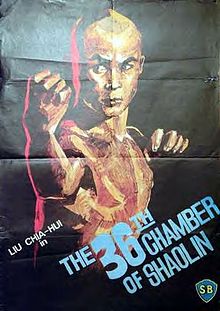- The 36th Chamber of Shaolin
-
The 36th Chamber of Shaolin 
36th Chamber of Shaolin posterDirected by Liu Chia-Liang Produced by Mona Fong
Run Run ShawWritten by I Kuang Starring Gordon Liu
Lo LiehMusic by Chen Yung-Yu Cinematography Huang Yeh-tai Editing by Geung Hing Lung
Li Yen-HaiDistributed by Shaw Brothers Studio
United States:
World Northal (dubbed)
Dragon Dynasty (DVD)Release date(s) 1978 Running time 115 minutes Language Mandarin The 36th Chamber of Shaolin (少林三十六房, Shào Lín sān shí liù fáng), also known as The Master Killer and Shaolin Master Killer, is a 1978 Shaw Brothers kung fu film directed by Liu Chia-liang and starring Gordon Liu.
The film follows a highly fictionalized version of San Te, a legendary Shaolin martial arts disciple who trained under the general Chi Shan, portrayed by the director's adopted brother Gordon Liu.
36th Chamber of Shaolin is widely considered to be one of the greatest kung fu films and a turning point in its director's and star's careers.[1][2][3] It was followed by Return to the 36th Chamber, which was more comedic in presentation and featured Gordon Liu as the new main character with another actor in the smaller role of San Te, and Disciples of the 36th Chamber.
Contents
Plot
A young student named San Te is drawn by his activist teacher into the local rebellion against the Manchu government. The government officials suppress the uprising and liquidate the school, killing friends and family members as well. San Te seeks vengeance. Wounded in an attack by Manchu henchmen, he flees to the Shaolin temple and seeks training in kung fu. Initially the Buddhist monks reject him, since he is an outsider, but the chief abbot takes mercy on the young man and lets him stay. One year later, he begins his martial arts training in the temple's 35 chambers and advances more rapidly than any previous student. Along the way, he is depicted as inventing the three section staff.
However, as San Te nears the end of his education, the temple officially exiles him as a surreptitious way to allow him to aid the people against the oppressors. He returns to the outside world, namely to his hometown, and assists the people by teaching them martial arts. Before the political revolution he is inspiring to complete, he is forced into conflict with the Manchu governor. Finally, he triumphs and returns to the Shaolin temple, where he establishes the 36th chamber, a special martial arts class for laypeople to learn kung fu.
Cast
The trailer (included as an extra on the DVD) credits the cast as follows:
- Monk San Te - portrayed by Liu Chia-Hui
- General Tien Ta - portrayed by Lo Lieh
- Rice Miller Six - portrayed by Wang Yu
- Hung Hsi-Kuan - portrayed by Yu Yang
- Lu Ah Tsai - portrayed by Hsu Shao-Chiang
- Tung Chien-Ching - portrayed by Wu Hang-Sheng
Distribution
The film received a DVD release by the Weinstein Company's Asian label, Dragon Dynasty on June 19, 2007. The DVD features commentary by the RZA and film critic Andy Klein, and an interview with Gordon Liu. A blu-ray release of the film is scheduled for March 2, 2010 from Vivendi Visual Entertainment.
Reception
36th Chamber of Shaolin is widely considered to be one of the greatest kung fu films ever made and a highly influential entry in the genre.[1][2][3]
The Wu-Tang Clan named their debut album Enter the Wu-Tang (36 Chambers).
See also
References
- ^ a b Pollard, Mark (2007-06-26). "Movie Reviews: 36th Chamber of Shaolin". Kung Fu Cinema. http://kungfucinema.com/?p=782.
- ^ a b Neveu, Janick (2003-08-27). "36th Chamber of Shaolin Review". Kung Fu Cult Cinema. http://www.kfccinema.com/reviews/kungfu/36thchamber/36thchamber.html.
- ^ a b Sanjuro (2003). "Reviews: The 36th Chamber of Shaolin". LoveHKFilm.com. http://www.lovehkfilm.com/reviews/36th_chamber.htm.
External links
- The 36th Chamber of Shaolin at the Internet Movie Database
- The 36th Chamber of Shaolin at AllRovi
Categories:- 1978 films
- Hong Kong films
- Hong Kong action films
- Shaw Brothers Studio films
- 1970s action films
- Kung fu films
- Mandarin-language films
- Films directed by Lau Kar-leung
- Films shot anamorphically
- Films set in the Qing Dynasty
Wikimedia Foundation. 2010.
